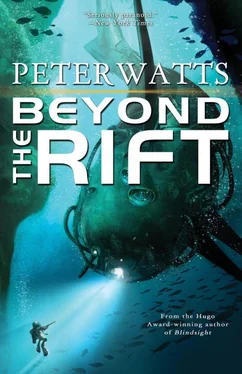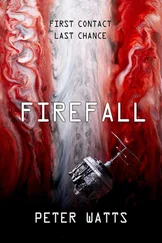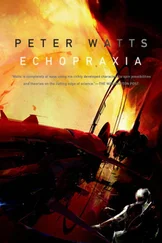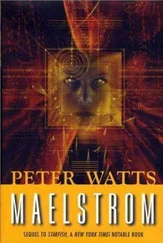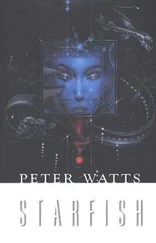Wescott thought of acetylcholinesterase and endogenous opioids. “You’re wrong, Carol. I know more about feelings than almost anyone in the world.”
On the screen, Lynne’s proxy sighed through a faint smile.
The simulation was wearing new earrings; they looked like antique printed circuits. Wescott wanted to comment on them, to compliment or criticise or do anything to force the conversation into less dangerous territory. But he was afraid that she had worn them for years and he just hadn’t noticed, so he said nothing.
“Why couldn’t you tell me yourself?” he said at last. “Don’t I deserve that much? Why couldn’t you at least leave me in person?”
“This is in person, Russ. It’s as in person as you ever let anyone get with you any more.”
“That’s bullshit! Did I ask you to go out and get yourself simmed? You think I see you as some sort of cartoon? My Christ, Lynne—”
“I don’t take it personally, Russ. We’re all cartoons as far as you’re concerned.”
“What in Christ’s name are you talking about?”
“I don’t blame you, really. Why learn 3D chess when you can reduce it down to tic-tac-toe? You understand it perfectly, and you always win. Except it isn’t that much fun to play, of course…”
“Lynne—”
“Your models only simplify reality, Russ. They don’t re-create it.”
Wescott remembered the printout in his hand. “Sure they do. Enough of it, anyway.”
“So.” The image looked down for a moment. Uncanny, the way it fakes and breaks eye contact like that— “You have your answer.”
“ We have the answer. Me, and a few terabytes of software, and a bunch of colleagues, Lynne. People. Who work with me, face to face.”
She looked up again, and Wescott was amazed that the program had even mimicked the sudden sad brightness her eyes would have had in that moment. “So what’s the answer? What’s at the end of the tunnel?”
He shrugged. “Not much, after all. An anticlimax.”
“I hope it was more than that, Russ. It killed us.”
“Or it could’ve just been an artefact of the procedure. The old observer effect, maybe. Common sense could have told us as much, I could’ve saved myself the—”
“Russ.”
He didn’t look at the screen.
“There’s nothing down there at all,” he said, finally. “Nothing that thinks. I never liked it down there, it’s all just…raw instinct, at the center. Left over from way back when the limbic system was the brain. Only now it’s just unskilled labour, right? Just one small part of the whole, to do all that petty autonomic shit the upstart neocortex can’t be bothered with. I never even considered that it might still be somehow…alive…”
His voice trailed off. Lynne’s ghost waited silently, perhaps unequipped to respond. Perhaps programmed not to.
“You die from the outside in, did you know that?” he said, when the silence hurt more than the words. “And then, just for a moment, the center is all you are again. And down there, nobody wants to…you know, even the suicides, they were just fooling themselves. Intellectual games. We’re so fucking proud of thinking ourselves to death that we’ve forgotten all about the old reptilian part sleeping inside, the part that doesn’t calculate ethics or quality of life or burdens on the next of kin, it just wants to live , that’s all it’s programmed for, you know? And at the very end, when we aren’t around to keep it in line any more, it comes up and looks around and at that last moment it knows it’s been betrayed, and it…screams…”
He thought he heard someone speak his name, but he didn’t look up to find out.
“That’s what we always found,” he said. “Something waking up after a hundred million years, scared to death…”
His words hung there in front of him.
“You don’t know that.” Her voice was distant, barely familiar, with a sudden urgency to it. “You said yourself it could be an artefact. She might not have felt that way at all, Russ. You don’t have the data.”
“Doesn’t matter,” he murmured. “Wetware always dies the same way—”
He looked up at the screen.
And the image was for Chrissakes crying , phosphorescent tears on artificial cheeks in some obscene parody of what Lynne would do if she had been there. Wescott felt sudden hatred for the software that wept for him, for the intimacy of its machine intuition, for the precision of its forgery. For the simple fact that it knew her.
“No big deal,” he said. “Like I said, an anticlimax. Anyhow, I suppose you have to go back and report to your—body—”
“I can stay if you want. I know how hard this must be for you, Russ—”
“No you don’t.” Wescott smiled. “Lynne might have. You’re just accessing a psych database somewhere. Good try, though.”
“I don’t have to go, Russ—”
“Hey, that’s not who I am any more. Remember?”
“—we can keep talking if you want.”
“Right. A dialogue between a caricature and an autopilot.”
“I don’t have to leave right away.”
“Your algorithm’s showing,” he said, still smiling. And then, tersely: “Stop.”
The cube darkened.
“Do y-ou want to cancel the program or just suspend it?” Carol asked.
He stood there for a while without answering, staring into that black featureless cube of perspex. He could see nothing inside but his own reflection.
“Cancel,” he said at last. “And delete.”
She’s been out there for hours now, listening to the clouds. I can see the RadioShack receiver balanced on her knees, I can see the headphone wires snaking up and cutting her off from the world. Or connecting her, I suppose. Jess is hooked into the sky now, in a way I’ll never be. She can hear it talking. The clouds advance, threatening gray anvils and mountains boiling in ominous slow motion, and the ’phones fill her head with alien grumbles and moans.
God she looks like her mother. I catch her profile and for a moment it is Anne there, gently chiding, Of course not, Jess, there aren’t any spirits. They’re just clouds. But now I see her face and eight years have passed in a flash, and I know this can’t be Anne. Anne knew how to smile.
I should go out and join her. It’s still safe enough, we’ve got a good half hour before the storm hits. Not that it’s really going to hit us ; it’s just passing through, they say, on its way to some other target. Still, I wonder if it knows we’re in the way. I wonder if it cares.
I will join her. For once, I will not be a coward. My daughter sits five meters away in our own back yard, and I am damn well going to be there for her. It’s the least I can do before I go.
I wonder if that will mean anything to her.
An aftermath, before the enlightenment.
It was as though somebody had turned the city upside down and shaken it. We waded through a shallow sea of detritus: broken walls, slabs of torn roofing, toilets and sofas and shattered glass. I walked behind Anne, Jess bouncing on my shoulders making happy gurgling noises; just over a year old, not quite talking yet but plenty old enough for continual astonishment. You could see it in her eyes. Every blown newspaper, every bird, every step was a new experience in wonder.
Also every loaded shotgun. Every trigger-happy National Guardsman. This was a time when people still thought they owned things. They saw their homes strewn across two city blocks and the enemy they feared was not the weather, but each other. Hurricanes were accidents, freaks of nature. The experts were still blaming volcanoes and the greenhouse effect for everything. Looters, on the other hand, were real. They were tangible. They were a problem with an obvious solution.
Читать дальше
